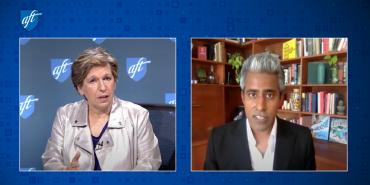Too often in America, the economy works only for the wealthy. But through elections and activism, AFT members can ensure that it works for everyone else. That was the crux of a spirited conversation between AFT President Randi Weingarten and Anand Giridharadas, author of Winners Take All: The Elite Charade of Changing the World.
In his book, Giridharadas, who is also editor-at-large for Time magazine, investigates the efforts of millionaires and billionaires to engage in philanthropy and portray themselves as caring for the poor while preserving their own power and undermining the very institutions (think public schools and unions) that are actually trying to enable opportunity. “He knows, like we do, something is deeply wrong with the economy,” Weingarten said in introducing him. She then highlighted figures from her State of the Union address that reveal just how extreme income inequality is in our country—long before the economic crisis driven by COVID-19. For instance, 78 percent of Americans were living paycheck to paycheck, and 40 percent of Americans couldn’t cover a $400 emergency. Yet since the pandemic’s spread, U.S. billionaires have added $584 billion to their own wealth, Weingarten said.
Giridharadas explained that teachers have borne the brunt of what he calls the “billionairization of America,” the process by which our country has become an increasingly oligarchic society run by, for and in the interests of a very small number of wealthy people (think Betsy DeVos). “We tell rich and powerful people the best lived life is a life spent making money in whatever way possible, cutting whatever societal corner you can,” he said. For instance, that’s why some wealthy individuals try to buy off politicians and avoid paying taxes. Because it has become fashionable in recent years for the wealthy to engage in philanthropy to enhance their reputations, many rich people have tried to extend their influence in public schools. “Who is it that has to implement their harebrained schemes?” asked Giridharadas. Why teachers, of course!
He decried how educators are pouring their hearts and souls into their students, yet “sending them into a world where social mobility has ground to a virtual halt.” Too many Americans are spending their nights worrying about how to pay their medical bills and save for retirement. “I’d much rather have people think about the lesson plan they want to teach tomorrow, the business plan they want to start,” he said.
“Elections are not enough,” Weingarten said. “You have to have elections and activism.” Thanks to both, AFT members have changed the narrative around public education. With the teacher strikes in the last few years, the right wing was unable to negatively portray teachers because they were standing up for their students. From West Virginia to Oklahoma to Los Angeles, teachers effectively defined what the real issues were and showed the public that “teachers really want what children need,” Weingarten said. “And we need the resources to get there.”
Giridharadas urged working people to rise up—not just against Trump and the Republican Party—but against the oligarchy America is becoming. There aren’t that many institutions left in America as big and influential as the AFT, he said. “You all have the influence. It’s up to you to decide how you want to spend it.”
Weingarten acknowledged this important call to action: “We need to defeat Donald Trump and move beyond that to a more equitable society.”
[Jennifer Dubin]

